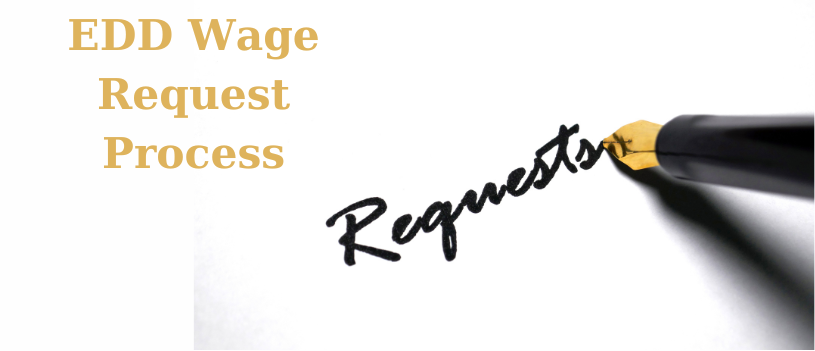If you are an employer, you may periodically receive a wage request from the EDD (or other state agency if located out of California). You must respond to these notices immediately to avoid being automatically charged for benefits that may be paid to former employees. You will not receive a bill directly, however, your unemployment tax rate would increase to the maximum as the reserves accumulated would be reduced by the amounts paid to the former employees. If paperwork is filed timely and you feel the claim should be denied, your appeal will be considered.
How does the wage request process work?
When the EDD must obtain wages from an employer, a Request for Wages (DE 1919) will be mailed to the employer. Employers will be asked to provide specific wage information related to specific quarters and to respond according to the instructions provided on the form. Employers have 10 days to respond to the EDD’s request for wages. In addition, the EDD will mail the unemployed individual an Affidavit of Wages (DE 23A) to request the wage information from the unemployed individual.
What happens if the employer does not respond to the EDD wage requests?
If the employer fails to respond to the DE 1919 within 10 days, and the individual returns the DE 23A along with tangible proof of wages he/she earned California’s Alternate Base Period (ABP) law requires the EDD to file the UI claim based on the wage information provided by the individual.
Under California’s ABP law, if the base period wages on an ABP claim are later adjusted, an overpayment may not be established on the ABP claim, unless the claim was funded based on fraudulent information provided by the claimant. This means that employers who do not respond timely to the EDD’s original DE 1919 may incur additional reserve account charges they might not have otherwise incurred had they responded timely.
How can Alternate Base Period wage inquiries be minimized?
To minimize the number of potential ABP wage requests that employers receive, the EDD recommends that employers:
- · File returns and reports as quickly as possible following the due dates.
- · Explore the advantages of using the EDD’s e-Services for Business that enables employers to file their returns and reports electronically.
Additional information about the ABP program can be found in the 2012 California Employer’s Guide (DE 44), available online at http://www.edd.ca.gov/pdf_pub_ctr/de44.pdf.
If you have any questions regarding this topic, feel free to give our office a call and we will be happy to discuss this information with you.
Candy

It is not my first time to pay a quick visit this web page, i am browsing this website dailly and take good facts from here everyday.
I am glad you find my posts helpful. I also share video blogs and podcasts on my YouTube Channel which you may also want to review. You can find my channel at https://www.youtube.com/channel/UCerh609TUTZf8rfosOYrpIQ
A copy of the DE 1919 would have been helpful
Unfortunately, the forms that are sent by the EDD go directly to the client and have sensitive data including employee names, and Social Security Numbers, and I can’t post a copy even if I had one. I’m sure you can understand why that info can’t be shared in an image. I wanted to educate about the process in case someone did receive a notice. The blog was written almost 10 years ago, but I just did a search on the EDD website to see if they had a blank copy on their site now to share with you, but it does not. Please remember I do my best to educate business owners on various topics to help them, and this is one of the topics that employers sometimes have questions about.